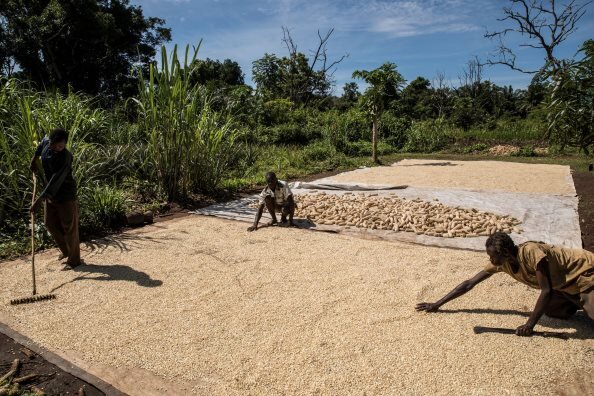On World Food Day, Government and United Nations highlight healthy diets in South Sudan

Joining the Ministry of Agriculture and Food Security in celebrating World Food Day, which falls annually on 16 October, three UN agencies—the Food and Agriculture Organization of the United Nations (FAO), UNICEF and the World Food Programme (WFP)--also encouraged recognition of the contribution of women to food security and nutrition.
This year’s commemoration is being held in Yambio under the national theme ‘Healthy diets for a #Zero Hunger future.’ The focus is on the importance of healthy diets and the contribution of smallholder farmers, including women, towards achieving “Zero Hunger” and fighting malnutrition in their communities.
“Zero Hunger is not just about addressing hunger, but also nourishing people while nurturing the planet. Far too many South Sudanese don’t have the option to access healthy and nutritious foods in an extremely fertile country, blessed with natural resources and rich in local nutritious food,” said Meshack Malo, FAO’s Representative in South Sudan. “We need to act fast and make sure South Sudan utilizes its full production potential, so that more people can live healthier lives.”
Although the food security situation has slightly improved in the last few months, hunger persists in South Sudan with some 4.5 million people struggling to meet their food needs between now and the end of the year. The number of people in need is projected to rise to 5.5 million people in January 2020 driven by localized conflicts, climatic shocks, prolonged depletion of household assets and economic hardships.
“Conflict is the most destructive of all the factors affecting food stability in the country, disrupting livelihoods and increasing displacement,” said Mary-Ellen McGroarty, WFP’s acting Country Director in South Sudan. “A Zero Hunger world starts with a peaceful one. With peace and stability, South Sudan could quickly recover from the crisis, boost agricultural production and access its healthy and nutritious food.”
Some 16 percent of children in South Sudan suffer from acute malnutrition in 2019, caused by inadequate access to healthy and nutritious food, and by a lack of access to health care, water, sanitation and hygiene. About 1.3 million children are projected to suffer from acute malnutrition in 2020.
“Every child has the right to a healthy life and therefore every effort in preventing malnutrition needs to be taken,” said Dr Mohamed Ag Ayoya, UNICEF Representative in South Sudan. “There is need to combine both treatment and prevention activities to combat malnutrition and healthy diets are crucial to bring the much-needed change.”
World Food Day marks the anniversary of the founding of FAO in 1945. The main objective of the day is to heighten public awareness about the nature and dimensions of long-term global food challenges, and to develop further national and international solidarity in the struggle against hunger, malnutrition and poverty.
As Hon. Onyoti Adigo Nyikwec, Minister for Agriculture and Food Security, concluded “Our vision is food and nutrition security for all the people of South Sudan. It is time to renew our commitment towards a South Sudan free from hunger and all forms of malnutrition. Safeguarding food security and nutrition of our people is a shared responsibility.”
Topics
South Sudan CampaignsContact
For more information, contact:
WFP
Tomson Phiri, WFP South Sudan
+211 922 465 247
tomson.phiri@wfp.org
FAO
Mattia Romano, FAO South Sudan
+211 917 043 531
mattia.romano@fao.org
UNICEF
Yves Willemot, UNICEF South Sudan,
+211 912 162 888
